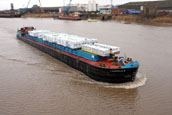

LINCOLNSHIRE: Timber manufacturer John Brash has been trialling the use of barges to transport timber from the ports to its manufacturing base with the aim of reducing its carbon footprint.
The company manufactures high quality roofing battens and scaffold boards at its site in Gainsborough from European softwood imported via the ports of Hull and Goole.
The timber is usually transported by lorry the 47 miles from Hull, or 30 miles from Goole. However, Brash was keen to open up new, greener routes to site and therefore, after six months of planning, the company recently launched a trial using barges on the Trent.
The barges load at the docks and can transport the equivalent of more than six lorry loads per barge to a local wharf at West Stockwith, four miles from the John Brash manufacturing site. There, the timber is offloaded using a 50-tonne crane, erected specifically to support the barge trial.
John Brash's chairman and managing director Mike Hartley said: "We undertook this trial to see if we could reduce both our carbon emissions and the pressure on the local road network without incurring excessive costs. The initial results have been very encouraging."
John Brash is working closely on the trial with its European timber suppliers, particularly Stora Enso and Setra, which has involved detailed liaison over shipping arrangements. The company also had to organise its transport plan around tides on the Trent, limited access through some of the locks, and the scheduling of major vessels using the docks.
Brash has also been working with barge advisors, BargeConsult, and long-established Lincolnshire barge operators Branford Barge Owners, who already transport aggregates along the Trent. Despite a few initial obstacles, the company has achieved an efficient schedule and plans to run ten barges during the period of the trial, each carrying up to 282m3 of timber.